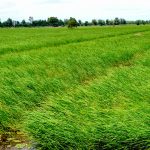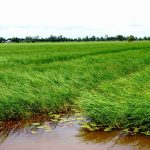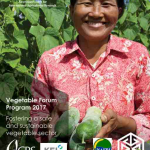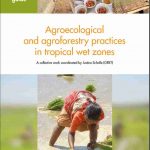3 downloads
Title of document: The Bolaven Plateau Coffee Producers Cooperative Authors: CPC Journal’s name if any: Ministry/Government Agency/Organisation: Fair Trade Laos, FAIRTRADE, CANADA Organic, USDA Organic Year of publication: 2016 Geographic focus: Lao PDR Main issues / topics addressed (for example: A model organization for Lao coffee smallholders, What are farmers benefits, Reason why a better income……) School of agroecology (if any): Web address to original document (if any): Summary: The Bolaven Plateau Coffee Producers Cooperative An organization to improve living conditions of Lao coffee smallholders This presentation talking about a model organization for Lao coffee smallholders, binifits and better income for farmer Read More
5 downloads
Title of document: Soil Laboratory quality control of DALaM Authors: Xaysatith SOULIYAVONGSA Journal’s name if any: Ministry/Government Agency/Organisation: DALaM, SEAL NET 2.0 Year of publication: 2016 Geographic focus: Lao PDR Main issues / topics addressed (for example): Brief History, Analysis ability, bringing the lab to international standard ……) School of agroecology (if any): Web address to original document (if any): Summary: This presentation talking about Soil Laboratory quality control of DALaM and bringing the LAB to international standards Read More
7 downloads
Title of document: Organic by default: Myth or Reality? Evidence from the Lao PDR Authors: Isabelle Vagneron, Sylvaine Lemeilleur, Lytoua Chialue Journal’s name if any: Ministry/Government Agency/Organisation: CIRAD (UMR MOISA), NUoL (Faculty of Agriculture) Year of publication: Geographic focus: Lao PDR Main issues / topics addressed (for example): Voluntary Sustainability Standard, organic agriculture, farming and marketing practices……) School of agroecology (if any): Web address to original document (if any): Summary: Presentation talking about differences between organic and non-organic farmers in terms of education, endowments, farming and marketing practices and performances Read More

20 downloads
Title of document: Presentations from the Regional Forum on Promoting Sustainable Agriculture in the Mekong Sub-Region towards Food Security, An Giang University, Vietnam 6-7 November 2017 Authors: Ministry/Government Agency/Organisation: An Giang University, ALiSEA, SEARCA Year of publication: 2017 Geographic focus: Mekong Region Summary: The Mekong Sub-region is rapidly becoming a new frontier of economic growth in Southeast Asia due to its rich human and natural capital (ADB 2017). Its suitability for a wide range of crops has made agriculture one of the sub-region’s important economic sectors. It has also led to increased trade and investment linked to regional integration. More than two-thirds of the population of the countries comprising the Mekong Sub-region rely heavily on agriculture for their livelihoods (WWF Greater Mekong). These countries are Cambodia, the Lao People's Democratic Republic (Lao PDR), Myanmar, Thailand, and Vietnam. The People's Republic of China (Yunnan Province) is a part of this sub-region but for purposes of this forum is not included. The forum aimed to share research findings from SEARCA SFRT grantees across the Mekong Sub-Region, as well as develop research to address gaps, towards the promotion of ecological farming, adaptation to climate change, and improving rural livelihoods and food security. This forum covered Seed Fund for Research and Training (SFRT) research from 2013 to 2016 where 11 out of 15 studies of Vietnamese and Myanmar grantees are relevant to the above subject (none from Cambodia, Lao PDR, and Thailand for the period). The expected participants were selected local researchers from universities in Vietnam, particularly in the Mekong Delta, SFRT grantees and SEARCA Fellows/scholarship alumni from Cambodia, Lao PDR, Myanmar, Vietnam and Thailand. It also featured research conducted by the Research Center for Rural Development (RCRD) of An Giang University under the project component Agroecology Learning Alliance in South East Asia (ALiSEA). The ALiSEA component supports activities aimed at increasing visibility and credibility of the agroecology movement, and scaling up the development and adoption of agroecological practices among farmers. Here are the presentations of the Seed Fund for Research and Training (SFRT) research from 2013 to 2016: Assessment of Impacts of and Adaptation to CC in Fisheries and Agriculture - Mac Nhu Binh Assessment of the Impact of CC to Aquaculture Fisheries Household - NTHDiep Assessment of Traditional Rice Based Farming Systems - LT Phong Climate Change Impact on Rice Production and Adaptation - Huynh Viet Khai Enhancing Marketing Capacity for Agriculture Cooperatives - QTXuan Gender roles and relationship in water management - Nguye Van Thai Impact of Rural Out-migration on the Resilience of Agricultural - Seinn Seinn Mu Promoting Sustainable Agriculture in the Mekong Sub-Region_ Ngo Thanh Son Read More

18 downloads
Title of document: Presentations from the Regional Forum on Promoting Sustainable Agriculture in the Mekong Sub-Region towards Food Security, An Giang University, Vietnam 6-7 November 2017 Authors: Ministry/Government Agency/Organisation: An Giang University, ALiSEA, SEARCA Year of publication: 2017 Geographic focus: Mekong Region Summary: The Mekong Sub-region is rapidly becoming a new frontier of economic growth in Southeast Asia due to its rich human and natural capital (ADB 2017). Its suitability for a wide range of crops has made agriculture one of the sub-region’s important economic sectors. It has also led to increased trade and investment linked to regional integration. More than two-thirds of the population of the countries comprising the Mekong Sub-region rely heavily on agriculture for their livelihoods (WWF Greater Mekong). These countries are Cambodia, the Lao People's Democratic Republic (Lao PDR), Myanmar, Thailand, and Vietnam. The People's Republic of China (Yunnan Province) is a part of this sub-region but for purposes of this forum is not included. The forum aimed to share research findings from SEARCA SFRT grantees across the Mekong Sub-Region, as well as develop research to address gaps, towards the promotion of ecological farming, adaptation to climate change, and improving rural livelihoods and food security. This forum covered Seed Fund for Research and Training (SFRT) research from 2013 to 2016 where 11 out of 15 studies of Vietnamese and Myanmar grantees are relevant to the above subject (none from Cambodia, Lao PDR, and Thailand for the period). The expected participants were selected local researchers from universities in Vietnam, particularly in the Mekong Delta, SFRT grantees and SEARCA Fellows/scholarship alumni from Cambodia, Lao PDR, Myanmar, Vietnam and Thailand. It also featured research conducted by the Research Center for Rural Development (RCRD) of An Giang University under the project component Agroecology Learning Alliance in South East Asia (ALiSEA). The ALiSEA component supports activities aimed at increasing visibility and credibility of the agroecology movement, and scaling up the development and adoption of agroecological practices among farmers. Here are the presentations of the plenary session: Development potentials for floating rice cultivation in Ayeyarwady Delta Region, Myanmar - Nilar Aung Integrating collaborative co-designed research and citizen sciences for conservation of floating rice in the Mekong Region, Vietnam - Dr. N V Kien Sarus crane, an indicator of sustainable agriculture in the Ayeyarwady Delta, Myanmar - Tran Triet Scoping Floating rice based agro-ecological farming system, Myanmar - Dr Thein Tun Trade-offs between ecosystems services in rice cropping system, Cambodia - Dr Malyne Neang Read More

22 downloads
Title of document: Presentations from the Laos Vegetable Forum 2017: Fostering a safe and sustainable vegetable sector Authors: Ministry/Government Agency/Organisation: CRS, KEI, NAFRI, ACIAR Year of publication: 2017 Geographic focus: Lao PDR Summary: In the Lao PDR, vegetable production provides around 80% of domestic demand, mostly produced by smallholder farmers. Throughout the country, there are large differences in consumption between provinces. Challenges to vegetable production include suboptimal yields, poor competitiveness, high postharvest losses, product that does not conform to quality and safety demands of consumers, limited technical capacity and difficulties in meeting market demand during some periods of the year. Additionally, the recent establishment of the ASEAN Economic Community has implications for cross-border trade regulations. Thus there are many opportunities for both producers and the private sector to benefit from improved connections and sustainability. The vegetable sector offers smallholder farmers an option to diversify their production systems and market opportunities, improve household nutrition and increase incomes for farmers and traders. Importantly, it also offers women a source of income, and can help improve household food security. As the sector develops, opportunities for market engagement, input supply and agro-processing will increase. These challenges and opportunities can be addressed in many different ways, and with a range of stakeholders. In Laos, there are public, private and development partners working to improve the productivity and profitability of the vegetable sector. Bringing these stakeholders together at a forum is a way to understand the current situation in Laos and create potential networks to foster sustainability in the sector. The Lao Vegetable Forum has been organized on 26th October, 2017 at the Crowne Plaza Hotel, Vientiane. The forum had several objectives, including to: - Highlight the latest research and development activities; - Forge networks between public, NGO and private sector professionals throughout the region working in this area for communication and collaboration; - Provide an opportunity to learn about developments in the region; and - Facilitate the exchange of ideas on sector development. In the first forum, the theme was ‘Fostering a safe and sustainable vegetable sector’. It started with an overview of the current status of the Lao Vegetable Sector. The main sessions focused on introducing different kinds of standards, and then options and examples of smallholder organisation and market arrangements. A final panel discussion was held to highlight the experiences of different kinds of stakeholders within the vegetable sector. Key themes that arised from the presentations and discussions will be synthesised and addressed in subsequent forums. Read More
9 downloads
Title of document: DEMAND FOR ORGANIC AGRICULTURE PRODUCTS IN CHIANG MAI Authors: Manawin Songkroh (Ph.D.) Journal’s name if any: Ministry/Government Agency/Organisation: Maejo University Chiang Mai, Thailand Year of publication: 2015 Geographic focus: National level Main issues / topics addressed (for example: Organic agriculture product, market opportunity, organic product demand …) School of agroecology (if any): Web address to original document (if any): Summary: This study aims to confirm relationship of determinants of demand for organic agriculture products in Chiang Mai. Self-administerred questionnaires was sent out to respondents in Chiang Mai and Lampang. Data analysis was done by multiple regression analysis. The results prove demand theory of determinants but various degree of importance. For application of the results, producers should provide more information regarding consuming organic products to increase demand and to consumer with higher income as they tend to consumer more organic food than those of lower income consumers. Nowadays, demand for organic products has been increased as consumers realizes the benefits of having good health in the long run. The production of organic products experiences with higher production cost. Regular production utilizes the chemicals pesticide while organic producers choose to use other more expensive methods. Nevertheless, the growth of organic product recently has made the industry experienced with external economics of scale resulting in the lower cost of organic product industry. The author strongly recommend that producers should increase demand by providing more information regarding benefits to consumers including benefits on protecting environment. This should stimulate demand as Taste has the highest degree of 0.28 (the second biggest). The 0.29 Income infers that marketing of organic products must be targeted at higher income level consumers to ensure the increase of demand. Determinants of price and price of complimentary products confirm demand theory; and there is no use of managerial perspective. In sum, to increase organic products demand, information about benefits of consuming it must be publicized as much as possible and to higher income consumers. Read More

56 downloads
Title of document: Agroecological and agroforestry practices in tropical wet zones Authors: A collective work coordinated by Justine Scholle (GRET) Ministry/Government Agency/Organisation: GRET Year of publication: 2017 Geographic focus: Mekong Region and Central Africa Summary: This guide is designed as a support tool for technicians and farmers involved in actions to promote and develop agroecology. It is a follow-up to a first technical guide published in 2014 in the Democratic Republic of Congo as part of the DEFIV project, a food security project implemented by GRET, funded by the European Union and Agence française de développement. This guide features two parts: The first part presents the current context and issues of agroecology in tropical wet regions. Having demonstrated the limits of conventional agricultural systems, analysed the effects of deforestation, the green revolution and climate change, the authors specify the objectives and the principles of agroecology, and remind readers of the conditions necessary to promote it. The second part is very operational and covers the various agroecological techniques, which were tested in a tropical wet context with satisfying results in the Democratic Republic of Congo (DEFIV project), Cambodia (APICI project) and Myanmar (Delta and NRS projects). Firstly, the various agroecological techniques are presented, and secondly the plants used to implement these techniques are described. Naturally, techniques such as plant inventories mentioned in this guide are not exhaustive. Read More
3 downloads
Title of document: Farmers’ adoption of pollution-free vegetable farming in China: Economic, informational, or moral motivation? Authors: Ying Xiong, Xiao Li , and Peng He Ministry/Government Agency/Organisation: Agricultural Information and Rural Economy Institute, Sichuan Academy of Agricultural Sciences, Chengdu,P.R. Chin; Center for Rural Development Research, Sichuan Academy of Agricultural Sciences, Chengdu, P.R. China Year of publication: 2016 Geographic focus: China Summary: Based on the survey data of 420 vegetable farmers in China, the logit model is used to analyze farmers’ adoption motivation of pollution-free vegetable farming and quantify the degree to which pollution-free vegetable farming is the result of economic benefits, information acquisition, moral obligation incentives or a combination of these motivations. The results reveal that besides the effects of non-farm income and vegetable acreage in farm characteristics, farmers’ adoption of pollution-free vegetable farming is mainly motivated by economic, informational and moral incentives. Specifically, pollution-free vegetable price, economic support from the governments, joining rural economic organizations and market supervision are verified to affect farmers’ adoption positively. Relative to the incentives from information acquisition and moral obligation, economic benefits play a greater role in promoting farmers’ pollution-free vegetable farming. Economic support from the governments has the biggest impact on adopting pollution-free vegetable farming. Therefore, pollution-free vegetable farming may be promoted towards a profit-driven way. Furthermore, it is necessary to explore a joint mechanism between farmers and rural economic organizations, and provide agricultural extension services with a joint goal of agri-food yield and safety. Market supervision also needs to be strengthened by improving relevant laws and rules and implementing them more strictly. This study contributes to identify the factors affecting farmers’ PFVF adoption. The results show that farmers are mainly motivated by multiple objectives including economic benefits, information acquisition and moral obligation. The research reveals that the assumption of economic motive alone may be inadequate in the understanding of farmers’ PFVF adoption. Pollution-free vegetable price, economic support from the governments, joining rural economic organizations, market supervision and vegetable acreage have significantly positive impacts on farmers’ adoption and the effect of non-farm income is significantly negative. Moreover, relative to the motivations of information acquisition and moral obligation, the incentives from economic benefits play a greater role. Read More
18 downloads
Title of document: Stories From The Field - Women working toward a non-toxic environment Author: Ilang Ilang Quijano et al. on behalf of Towards a Non-toxic Southeast Asia Date of publication: 2016 Geographical focus: Cambodge, China, Laos, Thailand, Vietnam Summary: The often unseen but disastrous consequences of chemical-intensive food and agricultural production are felt most by half of the world’s food producers and rural population: women. On the average, women make up about 43 percent of the agricultural labour force in developing countries, according to the Food and Agriculture Organization (FAO). Women are involved in all stages of food production—everything from seed collection, land preparation, fertilizer and pesticides application, weeding, harvesting and storage, food processing, and livestock rearing. In addition, they are also responsible for most household and child-rearing activities. This booklet contains a collection of stories of 25 women from five countries who are involved in an inspiring, ongoing campaign to eliminate use of chemical pesticides and promote agroecology in the Mekong Region. These women are part of the programme Towards a Non-toxic SouthEast Asia, a programme aiming to reduce health and environmental risks from chemicals by monitoring, regulating and managing agricultural, industrial and consumer chemicals. Partners in this initiative are the Swedish Chemicals Agency (KemI), Food and Agriculture Organization of the United Nations (FAO), Pesticide Action Network Asia and the Pacific (PAN AP) and The Field Alliance (TFA). The stories in this booklet highlight how women were influenced by the work of these dedicated organizations and how various activities and support resulted in mobilization of communities to start working for improved livelihoods, through reduction of pesticides use and shift to agro-ecology. Read More

 Asia & Mekong Region
Asia & Mekong Region  Cambodia
Cambodia  Laos
Laos  Myanmar
Myanmar  Other
Other  Vietnam
Vietnam